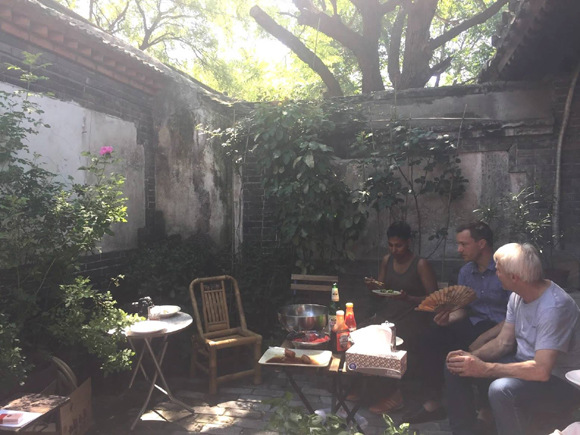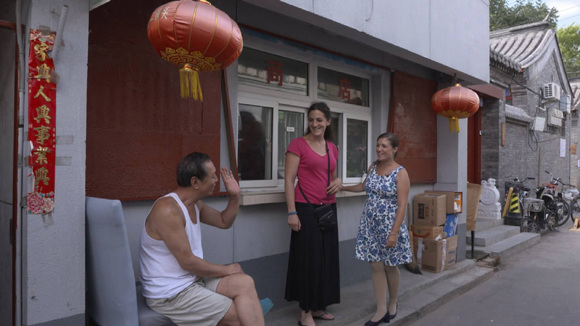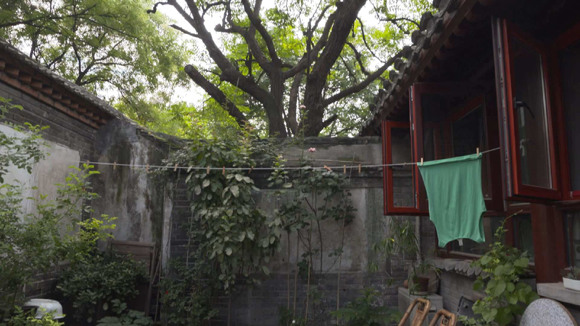
The outdoor space is a gathering point for Helene's friends and neighbors. (CGTN Photo)
Just a short walk off the busy Beijing street known as Guijie sit some of the city's most well-preserved hutongs, or lanes lined with traditional courtyard homes, known as siheyuan in Chinese.
Stepping into this labyrinth of narrow alleyways is almost like magic; all the noise from the traffic disappears in an instant and all that remains is relaxing calm and the sound of birds chirping.
It is for this reason that the hutongs retain their charm many decades after they were how most Beijingers lived. Over the years, they have been subject to the whims of real estate developers and city planners and have suffered despite formal protection. This year has seen the shuttering of countless shops and restaurants in a campaign targeting illegal building modifications.
Hutong preservation is a delicate subject, and one that these neighborhoods' residents are perhaps best placed to tackle. Among them are many non-Chinese immigrants – such as Hélène Lemerle.
Hélène and her husband Tony Zhang bought their hutong home in 2008. It is one section of a traditional courtyard house that has been split into smaller residences.
It features a cozy outdoor space with greenery, while the L-shaped living quarters are built around it. On the inside, the couple have put a lot of effort into decorating. With one bedroom, a living room, kitchen, and a toilet on top of which is a guest bed, it has all the necessary amenities.
This is, however, not the first hutong Hélène has lived in. Back in 2004, the couple rented another hutong, which had not yet made its transition into modernity.
"At the time, people still used coal not electricity, so we needed to light the stove, because we used a traditional heater," Hélène recalls. "At least it wasn't the kind placed close to our bed but rather in the kitchen. It had some pipes, and it boiled the water, which ran through the heating radiator, so there was less possibility of carbon monoxide poisoning."
Changing the coals was a daily routine with Hélène taking the morning shift, and Tony doing the evenings.

Hélène talks to neighbors. (CGTN Photo)
While in her own home, coal has been replaced by electricity, this is not the only example of some of the impracticalities of hutong life Hélène has been willing to accept. She works as translator for a driving school in Shunyi District, past Beijing Capital Airport; the return journey takes around two hours each day. It's the price she is willing to pay for hutong living.
She explains, "People have a very warm relationship [in the hutongs]. I believe that it was the same case in every corner of the world 100 years ago. You're familiar with your neighbors, and are willing to help one another. However, in our modern society, people living in high-rise buildings don't know each other, and never greet each other when taking a lift. It feels lonely. That, to me, is the most precious thing about living in the hutongs. I get to know many friends."
Of course, in 2017, she has witnessed the large-scale renovation project that has become known as "bricking-up".
Extensions and modifications made to the hutongs over many years, that were technically in breach of regulations, had up until fairly recently largely gone ignored. Then, over the past few months, with the strict enforcement of building regulations that "bricking-up" has entailed, extensions have been torn down and large glass windows bricked shut.

Courtyard of Hélène's home. (CGTN Photo)
Hélène is sad about the changes, which have seen many of her local grocery stores and favorite restaurants shut up.
"I don't understand it but I remain optimistic. I think people carrying out the policy have misunderstood it. They took a very simple approach; they overdid it and now many hutongs look ugly. Beijing is a capital city, it should have charm, but recently it has been looking disorderly. But I do believe it will get better."
Rediscovering China is a 30-minute features program offering in-depth reports on the major issues facing China today.


















































